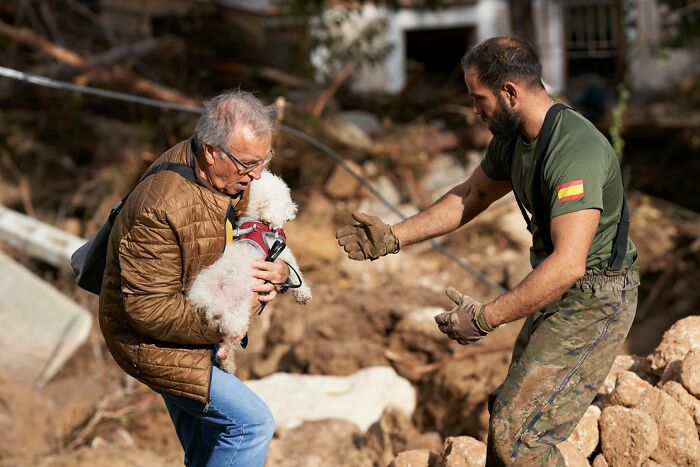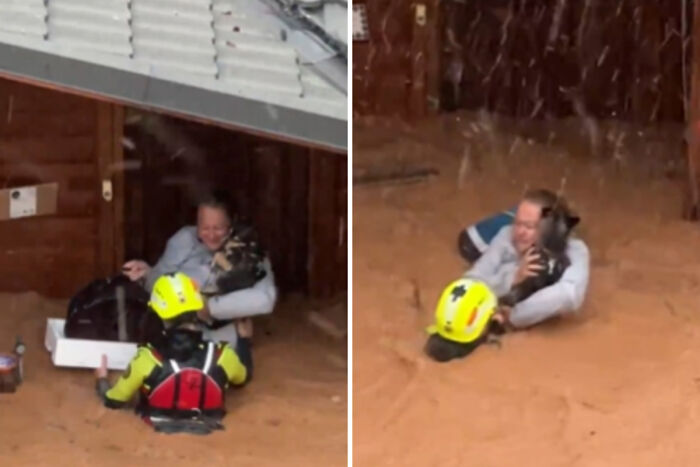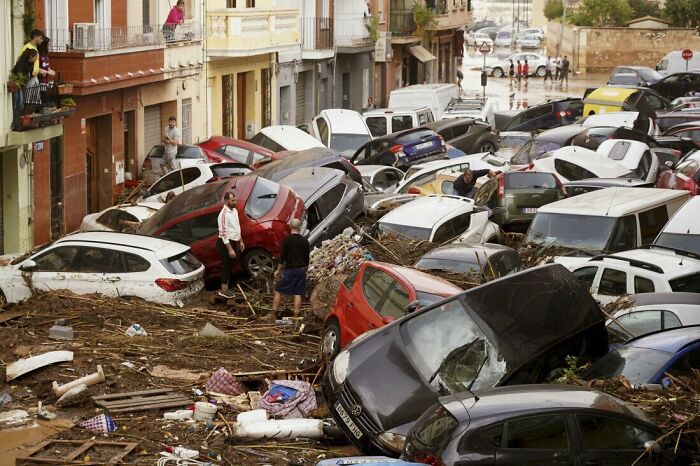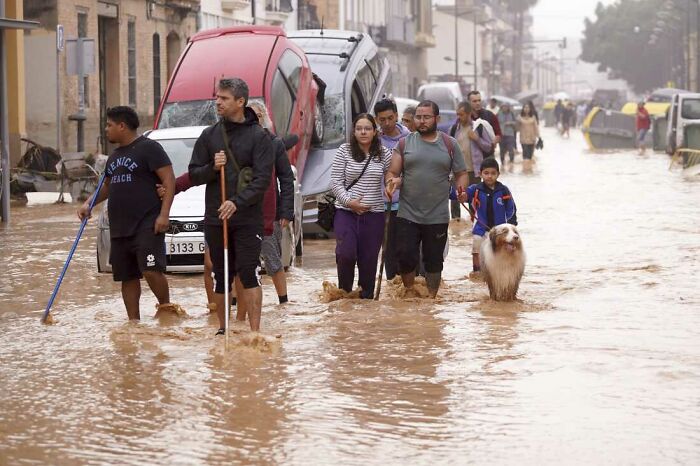Theterrifying momentwhen awomanalmost lost her life trying tosave her dogfromdrowning in Spainwas captured on camera earlier today (October 31).The shocking images show the owner refusing to let go of her dog. At the same time, the fast-moving water rose to her neck, threatening to wash her away until a rescue operative was able to reach her after landing in a helicopter, securing both her and the animal to a zipline, then successfully lifting her and saving their lives.HighlightsWoman clings to dog in neck-deep water during Spain’s historic floods.Spain’s storm dubbed worst natural disaster, causing 161 deaths so far.Meteorologist’s storm warning initially dismissed as alarmist.1,000 troops deployed to worst-affected areas like Valencia and Málaga.Dubbed “the worst natural disaster in Spain’s history,” the storm, which began last Tuesday (October 29), has caused more than 161 deaths at the time of writing. Precipitation levels were described as “raining a year’s worth of water in a single day.”As the climatic phenomenon continues to ravage the country, authorities haven’t been able to confirm the number of missing people, but it’s estimated to be in the “hundreds.”RELATED:A daring woman holds on to her dog in neck-deep floodwater while waiting for a rescue helicopter during Spain’s historic floodsImage credits:CNNThe first alert calls came via the AEMET, Spain’s meteorological agency, when one of its members warned citizens of a coming “high impact storm.” His statement was initially met with skepticism, with netizens labeling it “alarmist,” ridiculing his words as the local outletEl Diarioreported.“I wish someone had taken you seriously,” lamented one user tagging themeteorologiston X on October 30.Image credits:NewsweekThe expert acknowledged his critics, who deny the impact of climate change, in a post that same day. “Aside from the reasons that could have made this happen. I can only say that reality is often much more complex,” he wrote.Over 1,000 troops were deployed to theworst-impacted areasof the country, such as Valencia andAndalucia. Emergency respondents worked around the clock to ensure that people like the woman in thevideowere rescued on time and delivered to temporary shelters.Image credits:The AustralianDue to an overwhelming number of calls to Spain’s emergency number, 112, many have taken to social media toask for helpfor their families and neighbors.As Spain’s electric grid and natural gas distribution services have been severely damaged, people struggle to communicate with their loved ones. The lack of electricity is particularly problematic when it comes to people with disabilities or special requirements.Risk management experts stress the importance of keeping a well-supplied emergency kit at home, complete with charged batteries for those dependent on electricImage credits:The Australian“One of the toughest aspects of thesedisastersisn’t the disaster itself, but the shortage of supplies that usually accompanies them,” Camilo Prats, a risk management expert with nine years of experience working for the United Nations, explained toBored Panda.“It’s crucial to inform the authorities of the presence of people with disabilities or who are electro-dependent. Keeping a supply kit with charged batteries, medicine, non-perishable food, a first-aid kit, and physical cash is essential,” he added.Prats also touched upon the economic impact climate change has had on different areas around the world. Less developed countries tend to experience the worst effects as their economies are unable to recover from the damage these disasters cause.“International organisms have already warned about the financial deficit that exists to date when dealing with these events,” Prats explained. “There’s a disconnect between the economic impact of thedamagesand the ability of insurance institutions to cover them.”With the frequency of these events increasing, experts like Prats urge governments around the world to rethink their infrastructure. “Investing in prevention is cheaper than relying solely onemergency responseprocesses,” he added, explaining that traditional buildings will continue to be tested.Spain’s authorities declaredthree days of mourningfrom October 31 to November 2.Thanks! Check out the results:
Theterrifying momentwhen awomanalmost lost her life trying tosave her dogfromdrowning in Spainwas captured on camera earlier today (October 31).
The shocking images show the owner refusing to let go of her dog. At the same time, the fast-moving water rose to her neck, threatening to wash her away until a rescue operative was able to reach her after landing in a helicopter, securing both her and the animal to a zipline, then successfully lifting her and saving their lives.
HighlightsWoman clings to dog in neck-deep water during Spain’s historic floods.Spain’s storm dubbed worst natural disaster, causing 161 deaths so far.Meteorologist’s storm warning initially dismissed as alarmist.1,000 troops deployed to worst-affected areas like Valencia and Málaga.
Dubbed “the worst natural disaster in Spain’s history,” the storm, which began last Tuesday (October 29), has caused more than 161 deaths at the time of writing. Precipitation levels were described as “raining a year’s worth of water in a single day.”
As the climatic phenomenon continues to ravage the country, authorities haven’t been able to confirm the number of missing people, but it’s estimated to be in the “hundreds.”
RELATED:
A daring woman holds on to her dog in neck-deep floodwater while waiting for a rescue helicopter during Spain’s historic floods

Image credits:CNN
The first alert calls came via the AEMET, Spain’s meteorological agency, when one of its members warned citizens of a coming “high impact storm.” His statement was initially met with skepticism, with netizens labeling it “alarmist,” ridiculing his words as the local outletEl Diarioreported.
“I wish someone had taken you seriously,” lamented one user tagging themeteorologiston X on October 30.

Image credits:Newsweek
The expert acknowledged his critics, who deny the impact of climate change, in a post that same day. “Aside from the reasons that could have made this happen. I can only say that reality is often much more complex,” he wrote.
Over 1,000 troops were deployed to theworst-impacted areasof the country, such as Valencia andAndalucia. Emergency respondents worked around the clock to ensure that people like the woman in thevideowere rescued on time and delivered to temporary shelters.

Image credits:The Australian
Due to an overwhelming number of calls to Spain’s emergency number, 112, many have taken to social media toask for helpfor their families and neighbors.
As Spain’s electric grid and natural gas distribution services have been severely damaged, people struggle to communicate with their loved ones. The lack of electricity is particularly problematic when it comes to people with disabilities or special requirements.
Risk management experts stress the importance of keeping a well-supplied emergency kit at home, complete with charged batteries for those dependent on electric

“One of the toughest aspects of thesedisastersisn’t the disaster itself, but the shortage of supplies that usually accompanies them,” Camilo Prats, a risk management expert with nine years of experience working for the United Nations, explained toBored Panda.
“It’s crucial to inform the authorities of the presence of people with disabilities or who are electro-dependent. Keeping a supply kit with charged batteries, medicine, non-perishable food, a first-aid kit, and physical cash is essential,” he added.
Prats also touched upon the economic impact climate change has had on different areas around the world. Less developed countries tend to experience the worst effects as their economies are unable to recover from the damage these disasters cause.
“International organisms have already warned about the financial deficit that exists to date when dealing with these events,” Prats explained. “There’s a disconnect between the economic impact of thedamagesand the ability of insurance institutions to cover them.”
With the frequency of these events increasing, experts like Prats urge governments around the world to rethink their infrastructure. “Investing in prevention is cheaper than relying solely onemergency responseprocesses,” he added, explaining that traditional buildings will continue to be tested.
Spain’s authorities declaredthree days of mourningfrom October 31 to November 2.
Thanks! Check out the results:
Animals